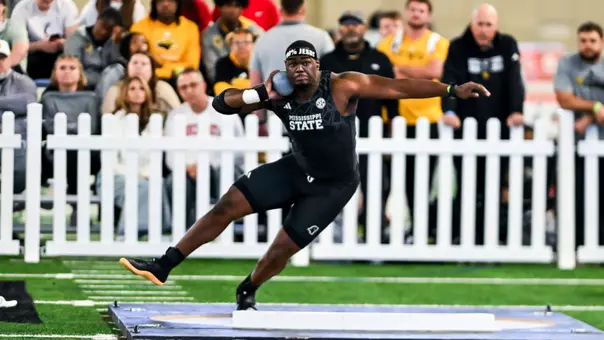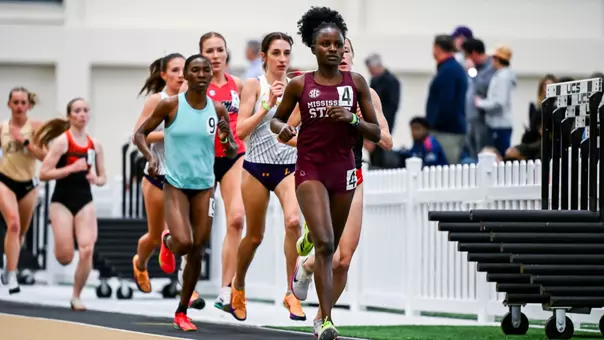
Photo by: PanAm Sports
Carrying Their Name
July 13, 2021 | Track & Field, Olympic Games
STARKVILLE – Two years ago Marco Arop was the youngest competitor in the men's 800m final at the 2019 Outdoor World Championships. Just three years into his organized track and field career, he was among the top eight men on the globe.
Arop ran for Canada that day and he holds that nation's record in the indoor 800m, but his life and story began more than 7,500 miles away in a war-torn Sudan.
Throughout the 1990s, Sudan was engulfed in its second civil war, a conflict with an estimated death toll topping two million people. Today, the United Nations Refugee Agency estimates that nearly 2.3 million Sudanese people have fled the country, and the Arops were one of those families.
Their first stop was in Egypt where they lived until Arop was a toddler. He doesn't have many memories from their time in Sudan, but he does remember living in an Egyptian apartment with his three older brothers before his two younger brothers were born. While both his parents were working, the boys found their own ways to entertain themselves.
"My oldest brother was nine years old then, and he'd take care of us while my parents were out," Arop remembered. "We also had a babysitter, but she wasn't always around. My biggest memories were just spending time doing reckless things with my brothers. Of course, I'm like three years old. My parents would come home and be upset because the house was just a mess."
The family then immigrated to Canada, living in Edmonton, the capital of Alberta. Today, that is what Arop will always consider his home, and he is grateful that his parents made the difficult decision that they did.
"I think they noticed a pattern over there early on," he said. "My dad's furthest level of education was high school, and my mom, she didn't actually go to school. I think she was in primary school and that was about it for her. They knew that if they'd stayed there, their kids would have probably ended up in the army. I guess they made the move more so for us than anything because they wanted to see us become successful and live a better life than they could dream of."
Reaching the World Championships three years into his running career and the Olympic Games just two years later is a meteoric rise that few can match. While it's true that Arop originally planned to play basketball in college rather than pursuing track, he admits he needs to slightly correct the popular narrative.
"Every time I say this I forget to mention that I did run a little early on in elementary before I played basketball," he said. "This was probably fifth or sixth grade. It wasn't a whole lot. Maybe like two weeks of the year we'd have a running club."
He even reached the city championships in sixth grade and finished fourth. Missing that podium is one thing that he said still drives him today.
However, once he reached middle school, basketball became the focus.
"Obviously, in gym class we had to run, and I was still excelling at it, but it was never really a focus of mine," Arop said. "Throughout high school, I had people come up to tell me, 'You should be on the track. You should be running.' Year in and year out, I'd make up some excuse not to."
Finally in his senior year, he decided he'd listen. After the basketball season wrapped up, Arop knew he wouldn't be playing in the spring league and instead signed up for a track meet. He initially entered himself in the 800m, the 1500m and the 3000m thinking his endurance would make the longer events fairly easy. Instead, his basketball coach scratched the 3000m for the 400m, allowing him to show the top speed he's now known for carrying at the bell in the 800m.
Being known for something, even anything at all, carries a special meaning for the young runner.
"My father has said this a couple of times. He grew up and nobody knew about him or his family," Arop said. "His father was born and died without ever being popular or known. Same thing with his grandfather. To be able to look at his own son and see his name on television or recognized by people around the world, that gives him a really great sense of joy."
 So now whenever he steps on the track, he carries the two things he is most grateful for and most proud of on his chest. Across his jersey is emblazoned "Canada," the home that made him who he is, and his bib reads "Arop," a way to carry his father and his family to international acclaim when he crosses the line.
So now whenever he steps on the track, he carries the two things he is most grateful for and most proud of on his chest. Across his jersey is emblazoned "Canada," the home that made him who he is, and his bib reads "Arop," a way to carry his father and his family to international acclaim when he crosses the line.
For Arop, one of the logical questions has always been does he belong more in a Sudanese singlet, having been born there, than wearing the red and black of Canada.
Only one Sudanese man has ever medaled at the Outdoor World Championships. Abubaker Kaki, who holds the national record, ran to a silver medal in the 800m in 2011, the same even Arop competes in. In fact, had he chosen to represent Sudan, Arop would be the second-fastest man in the country's history. Meanwhile, Canada's men had won 25 medals entering the 2019 World Championships.
"Personally, I don't see any conflict wearing the Canadian flag or representing Canada because that's where I grew up," he said. "Had I been raised in South Sudan, I definitely wouldn't be the person I am today. Even though I'm wearing the Canadian flag, I'm still representing the South Sudanese people and their country. At the end of the day, Canada is what made me who I am today. I feel like wearing them on my chest represents that."
But Arop hasn't forgotten where he came from. Following the Games in Tokyo this summer, he'd like to provide an opportunity for his parents to return home for the first time in nearly 20 years. The family has talked about making trips in the past, but finding the money or the time always kept them in Alberta.
"That's a long time to go without seeing siblings, without seeing your parents. It's been sort of difficult knowing that they made the choice that they made for us, but at the price of those sacrifices," he said. "I think being able to go back and see them and spend time with friends and family – I know it's definitely not going to be what they left – but just being back at home would mean everything to them."
For now, he continues training. Before leaving for a final international competition tour, Arop could often be found running around a lake on campus in Starkville.
"I always had this feeling up until 2018 that I'm still the new kid here and no one really knows me," he said. "I didn't really mind it. I'm just out here. There's no pressure at all. I'm having fun in the sport."
And as he zipped by the casual runners on the trail surrounding that lake, they would have never known that the humble kid from Sudan they're sharing the path with was bound for the Olympic Games.
Arop ran for Canada that day and he holds that nation's record in the indoor 800m, but his life and story began more than 7,500 miles away in a war-torn Sudan.
Throughout the 1990s, Sudan was engulfed in its second civil war, a conflict with an estimated death toll topping two million people. Today, the United Nations Refugee Agency estimates that nearly 2.3 million Sudanese people have fled the country, and the Arops were one of those families.
Their first stop was in Egypt where they lived until Arop was a toddler. He doesn't have many memories from their time in Sudan, but he does remember living in an Egyptian apartment with his three older brothers before his two younger brothers were born. While both his parents were working, the boys found their own ways to entertain themselves.
"My oldest brother was nine years old then, and he'd take care of us while my parents were out," Arop remembered. "We also had a babysitter, but she wasn't always around. My biggest memories were just spending time doing reckless things with my brothers. Of course, I'm like three years old. My parents would come home and be upset because the house was just a mess."
The family then immigrated to Canada, living in Edmonton, the capital of Alberta. Today, that is what Arop will always consider his home, and he is grateful that his parents made the difficult decision that they did.
"I think they noticed a pattern over there early on," he said. "My dad's furthest level of education was high school, and my mom, she didn't actually go to school. I think she was in primary school and that was about it for her. They knew that if they'd stayed there, their kids would have probably ended up in the army. I guess they made the move more so for us than anything because they wanted to see us become successful and live a better life than they could dream of."
Reaching the World Championships three years into his running career and the Olympic Games just two years later is a meteoric rise that few can match. While it's true that Arop originally planned to play basketball in college rather than pursuing track, he admits he needs to slightly correct the popular narrative.
"Every time I say this I forget to mention that I did run a little early on in elementary before I played basketball," he said. "This was probably fifth or sixth grade. It wasn't a whole lot. Maybe like two weeks of the year we'd have a running club."
He even reached the city championships in sixth grade and finished fourth. Missing that podium is one thing that he said still drives him today.
However, once he reached middle school, basketball became the focus.
"Obviously, in gym class we had to run, and I was still excelling at it, but it was never really a focus of mine," Arop said. "Throughout high school, I had people come up to tell me, 'You should be on the track. You should be running.' Year in and year out, I'd make up some excuse not to."
Finally in his senior year, he decided he'd listen. After the basketball season wrapped up, Arop knew he wouldn't be playing in the spring league and instead signed up for a track meet. He initially entered himself in the 800m, the 1500m and the 3000m thinking his endurance would make the longer events fairly easy. Instead, his basketball coach scratched the 3000m for the 400m, allowing him to show the top speed he's now known for carrying at the bell in the 800m.
Being known for something, even anything at all, carries a special meaning for the young runner.
"My father has said this a couple of times. He grew up and nobody knew about him or his family," Arop said. "His father was born and died without ever being popular or known. Same thing with his grandfather. To be able to look at his own son and see his name on television or recognized by people around the world, that gives him a really great sense of joy."

For Arop, one of the logical questions has always been does he belong more in a Sudanese singlet, having been born there, than wearing the red and black of Canada.
Only one Sudanese man has ever medaled at the Outdoor World Championships. Abubaker Kaki, who holds the national record, ran to a silver medal in the 800m in 2011, the same even Arop competes in. In fact, had he chosen to represent Sudan, Arop would be the second-fastest man in the country's history. Meanwhile, Canada's men had won 25 medals entering the 2019 World Championships.
"Personally, I don't see any conflict wearing the Canadian flag or representing Canada because that's where I grew up," he said. "Had I been raised in South Sudan, I definitely wouldn't be the person I am today. Even though I'm wearing the Canadian flag, I'm still representing the South Sudanese people and their country. At the end of the day, Canada is what made me who I am today. I feel like wearing them on my chest represents that."
But Arop hasn't forgotten where he came from. Following the Games in Tokyo this summer, he'd like to provide an opportunity for his parents to return home for the first time in nearly 20 years. The family has talked about making trips in the past, but finding the money or the time always kept them in Alberta.
"That's a long time to go without seeing siblings, without seeing your parents. It's been sort of difficult knowing that they made the choice that they made for us, but at the price of those sacrifices," he said. "I think being able to go back and see them and spend time with friends and family – I know it's definitely not going to be what they left – but just being back at home would mean everything to them."
For now, he continues training. Before leaving for a final international competition tour, Arop could often be found running around a lake on campus in Starkville.
"I always had this feeling up until 2018 that I'm still the new kid here and no one really knows me," he said. "I didn't really mind it. I'm just out here. There's no pressure at all. I'm having fun in the sport."
And as he zipped by the casual runners on the trail surrounding that lake, they would have never known that the humble kid from Sudan they're sharing the path with was bound for the Olympic Games.
Players Mentioned
TRACK & FIELD | NCAA NATIONALS PLAYERS MEDIA SESSION 5/30/24
Thursday, May 30
TRACK & FIELD | NCAA NATIONALS COACHES MEDIA SESSION 5/30/24
Thursday, May 30
TRACK & FIELD | Chris Woods Media Session - 02/23/23
Friday, February 24
Track and Field Chris Woods Media Session 033122
Thursday, March 31





